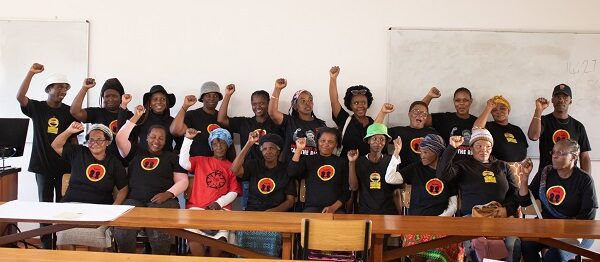By ‘Odidi Matai-Sigudla, Asiphesona Wonqwelo and Sindisiwe Tshona
Oxfam and the Unemployed People’s Movement (UPM) held a seminar on 28 March at Rhodes University’s Sociology Department aimed at challenging the patriarchy (where men are dominant), and having men and women work together in making a better society.
Speaking at the seminar were Makana’s executive mayor, Yandiswa Vara; Rhodes University Professor of Political and International Studies, Sally Matthews; Nosigqibo Soxujwa, feminist, Makana Citizens’ Front chairperson and teacher at CM Vellem school; and Busiswa Nyume, Oxfam’s Senior Projects Officer.
Vara said she was unhappy that only six councillors out of 27 in Makana were women. “As a woman, I am not happy, and nobody can be happy about that. If I could change that, I would” she said.
Vara expressed how difficult it is to be in power because people tended to forget that she was also a human being. However, “as a person, you should love being challenged because the more you are challenged, the more you grow,” Vara said.
“I owe it to myself. I owe it to women to show that we are capable and that we are also able to stand for our rights as women. That we fought for our rights. I am not the municipality. You are. Fight for your spaces, fight for your rights, fight for your voice to be heard. Nevertheless, it will only be achieved together,” Vara concluded.
Matthews said that despite Makana having a woman mayor, most of the councillors were men.
“It is not enough just to try to get power. We must free our minds. Power is getting someone to do what they do not want to do. If you can get people to think what you want them to think, then they will just do what you want them to do – you don’t have to use violence” Matthews said.
Citing Steve Biko’s famous quote, “the most potent weapon in the hands of the oppressor is the mind of the oppressed”, Matthews said the same concept could be applied to men and women, and women should question why they still did certain things that they did not want to do.
Soxujwa said, “We need to go back and teach the women in our community what we have and take back our power as women”.
Nyume spoke of the importance of women and youth being more active in the community. “We need to involve ourselves, participate in our communities, and attend the Integrated Development Plan (IDP) meetings. If you don’t attend the IDPs, the municipality will come to your community and build a stadium and then you will ask yourself ‘why are they building a stadium instead of building a clinic?'” said Nyume.
She added that municipal planning really affects women. “The problem with water affects us. We cook, we clean, we do washing. All that requires water. Men cannot talk about us without us. They don’t know our needs”, Nyume added.
It was of no use for women to “sit in a corner and cry about women being oppressed”, if they were not active in holding all levels of government accountable, she said.
Workshop participant Nelisa Nonkonyana agreed that women needed to free their minds so that they could stop men from bullying women. “In tradition, the highest position for men is speaking in Kraal, while the highest position for women is uDabawo”, she said.
“Women are placed on the floor far away to be silent and observe because only uTata (male) should speak,” Nomakhosazana Budaza elaborated.
MCF secretary and UPM activist Ayanda Kota asked how women could outnumber men in the population yet for every four men in the council; there was only one woman.
Gcobisa Mene, ANC councillor for Ward Five, said women must stop revering men. “Truthfully, we love men. We are the ones who appoint men in power,” said Mene.


